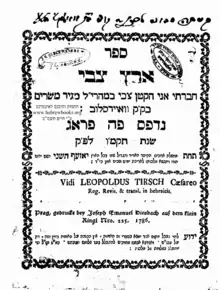Tzvi Hersh Bonhardt
Tzvi Hersh Bonhardt (Yiddish: רבי צבי הירש באנהאַרד; c. 1747 – 1810) later known as the Maggid of Vodislav was an 18th-century German-Jewish preacher and intellectual. He is also the father of Simcha Bunim of Peshischa.
Tzvi Hersh Bonhardt | |
|---|---|
 Title page of Eretz Tzvi | |
| Title | The Maggid of Vodislav |
| Personal | |
| Born | Tzvi Hersh Bonhardt c. 1747 |
| Died | c. 1810 |
| Religion | Judaism |
| Nationality | German |
| Spouse | Sarah Sirkin |
| Children | Simcha Bunim of Peshischa |
| Parents |
|
| Main work | Eretz Tzvi |
| Dynasty | Peshischa |
Biography
Born around 1747 in Leipzig, Germany to a family of staunch misnagdim, his father Judah Leib Bonhardt was a wealthy merchant and rabbi who amassed notable wealth importing and exporting goods from Poland to Germany. In his early years, Tzvi Hersh studied Medieval Jewish Philosophy, which he often references in his later works, quoting Ben Sira, Maimonides, Nahmanides and Ibn Ezra. He later moved to Vodislav, Poland, where he married Sarah Sirkin, the daughter of Betzalel HaLevi of Zhovkva. It was also during this time, that began to give sermons all over Poland, in which he promoted the juxtaposing of enlightenment rationalism with traditional Judaism, a belief which later defined the Peshischa movement. In 1784, he published his first work titled "Asara L'me'a" (lit. 'Ten to One Hundred') in Warsaw, which received minimal acclaim. However, in 1786, he published his magnum opus titled "Eretz Tzvi" (lit. 'The Land of Tzvi'), which was an extensive collection of all the sermons he had given. The work was widely received, even getting the approbation from Yechezkel Landau.[1] During his travels throughout Poland, Tzvi Hersh made several important business and religious connections, such as Moshe Auvergir-Kogov, whose daughter, he arranged for his son to marry. Following his son's marriage, both he and his son began to develop an interest in Hassidic Judaism. In his old age, Tzvi Hersh still continued to travel to several communities across Poland. On one of these trips he met with Yisroel Hopstein and asked him to give him a blessing. Hopstein replied stating that "You don't need my blessings, you have a son who will rescue you from wherever you are, even from the depths of hell!"[2] Tzvi Hersh later died around 1810 in Vodislav.
See also
- Asara L'me'a (עשרה למאה) - Torah database.
- Eretz Tzvi (ארץ צבי) - Torah database.
References
- Rosen, Michael, 1945-2008 (2008). "A Biographical Sketch of R. Simhah Bunim". The quest for authenticity : the thought of Reb Simhah Bunim. Urim Publications. pp. 47–48. ISBN 978-965-524-003-0. OCLC 837205625.CS1 maint: multiple names: authors list (link)
- "Heichal HaNegina: Tidbits from the Rebbe Reb Simcha Bunim of Pshischa". heichalhanegina.blogspot.com. Retrieved 2020-06-17.